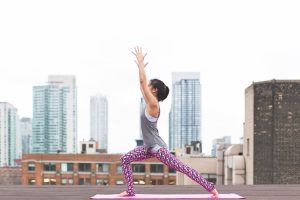Definition of Yoga

Yoga is an ancient system of relaxation, exercise, and healing with origins in Indian philosophy. Early descriptions of yoga are written in Sanskrit, the classical literary language of India. The first known work is “The Yoga Sutras,” written more than 2,000 years ago, although yoga may have been practiced up to 5,000 years ago.
Explore Yoga research in the following databases:
PubMed Trip Cochrane*
*The Cochrane database requires users to enter the search term manually. Enter “yoga”
AI Search: Access Semantic Scholar’s results on yoga.
Semantic Scholar
Learn more about our 3 research databases and AI search platform HERE.
Research Spotlight
The databases often return hundreds of medical studies for a single wellness approach. This section summarizes a sampling of five studies – providing just a taste of the available research.
- Virtual Yoga Classes Showed Major Impact on Back Pain, Use of Pain Meds, Quality of Sleep
A 2024 randomized controlled trial from the Cleveland Clinic studied two groups with back pain: one group did live-streamed group yoga classes (for 16 minutes, four times a week) and the other group continued medication as usual. The study found that just 12 weeks of virtual yoga classes reduced back pain intensity (six times greater reduction in pain intensity scores for the yoga group), improved back-related function (a 2.7 times greater boost), reduced the use of pain medication (34% fewer members of the yoga group needed medication), and even improved quality of sleep (ten times improvement for the yoga-doers). The researchers concluded that yoga is a real alternative to drugs for back pain with wide-ranging benefits.
Access this study on yoga
- Yoga Reduces Inflammation Markers in Cancer Patients, Cutting Risk of It Spreading or Returning
A 2023 study from University of Rochester medical researchers found that yoga has a powerful, positive effect on inflammation in cancer patients. The high-quality randomized control trial had 500 cancer patients do twice-weekly yoga or health education classes for a month. Blood tests showed that those practicing yoga had “significantly lower levels of pro-inflammatory markers” compared with patients in the education group. The researchers’ conclusion: “Clinicians should consider prescribing yoga for survivors experiencing inflammation, which increases risk of progression, recurrence and second cancers.”
Access this study on yoga - Pranayama Breathing Exercises Reduce Anxiety and Lead to Positive Changes in Brain
Pranayama is a set of techniques for controlling the breath, and a new randomized controlled trial from Brazilian doctors showed that this yoga breathwork practice led to decreased anxiety and negative affect. It’s the first study to show how Pranayama breathing impacts the brain: Using functional magnetic resonance imaging (fMRI), they found that Pranayama exercises led to changes in areas of the brain implicated in emotional regulation, including the amygdala, anterior cingulate cortex, anterior insula, dorsolateral prefrontal cortex, ventromedial prefrontal cortex, and ventrolateral prefrontal cortex.
Access this study on yoga
- Kundalini Yoga Found Beneficial for Anxiety Disorder
A 2020 randomized clinical trial from Harvard Medical School and Boston University (published in JAMA) compared 12-weeks program of cognitive behavioral therapy (CBT) and Kundalini yoga against a stress education control group, for people with generalized anxiety disorder (GAD). They found that CBT was still the best first-line treatment for GAD, but that the Kundalini yoga regime also significantly reduced anxiety disorder and may prove an important weapon for patients who cannot afford or aren’t interested in CBT.
Access this study on yoga - Yoga Program Shows Positive Impact for Migraine Sufferers
A 2020 study from the All India Institute of Medical Sciences compared standard medication to medication plus a two-month yoga program for migraine sufferers. They found that the yoga group had less migraines, fewer headaches overall, and consumed fewer pills – even though their headache frequency was higher at the study’s start. This is important, because migraine medications only work for about half of patients.
Access this study on yoga -
Yoga Significantly Improves Major Depressive Disorder Symptoms
A 2019 Boston University study indicated that yoga combined with breathing exercises improves symptoms of major depressive disorder. It was the first study to try to identify the optimal “dose”/duration of yoga practice. Participants were split into two groups: one did three 90-minute Iyengar yoga classes and four 30-minute breathwork sessions per week, while the other did two 90-minute Iyengar yoga classes and three 30-minute homework sessions per week. For both groups, sleep quality, energy, positivity, and anxiety and depression symptoms significantly improved within a month – and significant additional improvement was observed at three months.
Access this study on yoga - Kids Gain an Hour+ of Sleep After Yoga & Deep Breathing Training
A 2021 Stanford University study of 1,000 at-risk elementary school children found that mindfulness classes (combining yoga movement and breathwork) led to (on average) an extra 74 minutes of sleep per night and almost a half hour of REM sleep—a huge change. It was the first study to use polysomnography techniques, which measure brain activity, to assess how mindfulness training changes children’s sleep.
Access this study on yoga
Studies-in-Progress/Clinical Trials Underway
A clinical trial is any research study that assigns people to health-related interventions to evaluate the outcomes. “Interventions” include drugs, surgical procedures, devices, behavioral treatments, preventive care, etc.
- ClinicalTrials.gov: explore trials underway in the U.S.
- World Health Organization: explore trials happening across the globe. When you reach WHO’s search page, please type in “yoga.”
Access all studies currently available for Yoga in these databases:
PubMed Trip Cochrane* Semantic Scholar
*The Cochrane database requires users to enter the search term manually. Enter “yoga”.























































